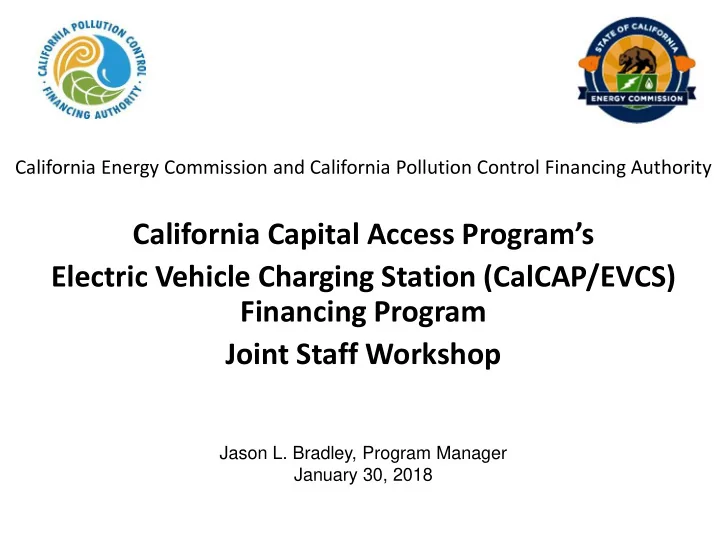

California Energy Commission and California Pollution Control Financing Authority California Capital Access Program’s Electric Vehicle Charging Station (CalCAP/EVCS) Financing Program Joint Staff Workshop Jason L. Bradley, Program Manager January 30, 2018
Today’s Topics Introduction and Workshop Format Background California’s EV Infrastructure Gap The Role of the CalCAP/EVCS Financing Program Stakeholder Feedback 2
Background Governor Brown’s Executive Order B-16-2012 set a goal of deploying 1.5 million zero emission vehicles (ZEVs) in California by 2025. Governor Brown’s most recent Executive Order B-48-18 increases the goal to deploying at least 5 million ZEVs on California roads by 2030 and specifically addresses the installation of car chargers. To reach these goals the Governor challenged state agencies and private industry to collaborate to make significant investment in EV infrastructure. 3
Infrastructure Gap The Governor's Office of Business and Economic Developments Zero-Emission Vehicle (ZEV) Infrastructure Unit reports that 14,272 chargers are currently deployed in California. The Energy Commission estimates that California will need at least 344,000 electric vehicle chargers at or near apartments, workplaces and public locations by 2025, equating to a gap in public and private investment of approximately $2.6 billion. The potential for the infrastructure gap to broaden could be impacted by the following: Expanded EV awareness Efforts to make EV an affordable and attractive option for more California Drivers OEM commitments to electrification – 42 ZEV models are on the market today and more to come 4
CalCAP EVCS Key Players Provides funding, policy and direction Administers 100% of the program Enrolls small business loans with the benefit of the credit enhancement Acquire and install EVCS and receive rebate at loan maturity 5
The Role of CalCAP/EVCS The CalCAP/EVCS Financing Program was developed to encourage financial institutions to lend private capital to small businesses and MUD owners to promote charging station installation. The program combines a lender loan loss reserve model with coverage up to $500,000 per borrower. Reduces the cost of charging station acquisition and installation by providing a rebate to small businesses. Supports loans that can be paired with other financing incentives to further reduce the overall cost of charging station acquisition and installation. 6
5 Steps of the Program Lender makes a charging station loan Lender sends Rebate sent to the enrollment to the borrower CalCAP/EVCS Financing Program Charging station(s) is Loan is paid off installed California Pollution Control Financing Authority
CalCAP/EVCS Lenders Eligible lenders include: All lenders that are currently CPCFA qualified lenders are eligible. New lenders with a California business presence are encouraged to apply. EVCS lender contact list is located at: http://www.treasurer.ca.gov/cpcfa/calcap/evcs/lenders.pdf 8
CalCAP/EVCS Borrowers Eligible borrowers include: Small businesses, both non-profit and for-profit , with 1,000 or fewer employees that own manage or operate: Additional incentive for businesses located in Disadvantaged Workplaces Multi Unit Developments Communities EV Fleets Destination Centers 9
What Can Be Financed? Purchase and acquisition of charging station(s) - Level 2 chargers - DC Fast chargers - Medium and heavy duty chargers Labor to install a fully operational charging station(s) Costs to operate, service and maintain a charging station(s) (including networking and subscription costs) Make-ready costs as long as they accompany the installation and operation of one or more charging station(s) 10
CalCAP/EVCS Contributions No lender or borrower contributions. All enrollments receive a base of 20% of the enrolled loan amount. Two options to increase the contribution to a maximum of 30% of the enrolled loan amount: Multi-Unit Dwelling: 10% Disadvantaged Community: 10% 11
CalCAP/EVCS Borrower Rebate Borrowers may be eligible for a rebate when the loan is paid off or after 48 months. CalCAP EVCS rebate calculations: 1. All eligible loans meeting the rebate requirements qualify for a 10% base rebate. 2. Loans for EVCS(s) located in Multi-Unit Dwellings (MUD) or Disadvantaged Communities (DAC) qualify for an additional 5% rebate. For example: Amount Item $25,000 Enrolled Loan Amount Maximum loan of $2,500 Base Rebate = 10% $500,000 = $75,000 . maximum rebate 0 No additional Rebate for MUD or DAC = 5% $2,500 Total Rebate Amount 12
CalCAP/EVCS Activity At the outset, CPCFA projected that $2 million in public funding for credit enhancements for lenders and rebates for borrowers could leverage between $6 and $10 million in private capital for the installation around 127 charging stations statewide. To date, one loan has been enrolled in CalCAP/EVCS. A private utility company, enrolled a loan for $11,124 to purchase a dual port charger. The borrower quickly paid off the loan to take advantage of the Program’s rebate feature. February 2017: CPCFA and California Energy Commission staff celebrated the installation of Anza Electric Cooperative’s charging station funded through the CalCAP/EVCS Financing 13 Program.
Stakeholder Feedback and Recommendations CPCFA and the Energy Commission would appreciate your insight on the following: What data and/or assistance do lenders or small businesses need for financial institutions to expand their small business electric vehicle infrastructure lending portfolio? How can the CalCAP/EVCS Financing Program support EV Infrastructure lending to the small business community? 14
Stakeholder Feedback and Recommendations Myth 1: Loans for charging station installation are too small for lenders to develop a portfolio. Myth 2: There is too much uncertainty about the useful life of charging station technology outliving the term of the loan. 15
Stakeholder Feedback and Recommendations Myth 3: There is too little data on the direct and indirect revenue that can be expected from charging stations. Myth 4: Lenders need a different incentive to offer charging station loans. 16
Wrap-Up Public Comment Written comments are due or must be postmarked by February 9, 2018 at 3 p.m. Send electronic copy to: CalCAP@treasurer.ca.gov Subject: CalCAP/EVCS Financing Program Mail hard copy, to: CPCFA CalCAP/EVCS P.O. Box 942809 Sacramento CA 94209-0001
Recommend
More recommend